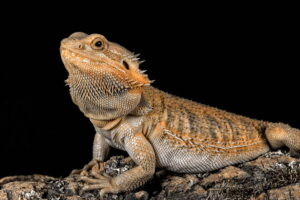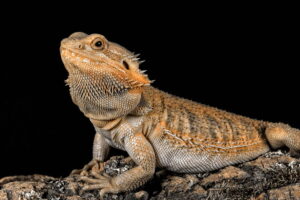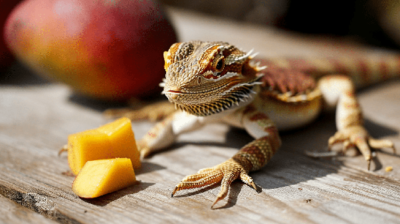Bearded dragons, with their diverse palate and adventurous appetite, often surprise their human companions with their willingness to sample various foods. Among the inquiries into their dietary preferences stands the question: do bearded dragons eat cantaloupe?
Bearded dragons can indeed eat cantaloupe, but it should be offered only as an occasional treat in moderation. Cantaloupe is high in water content and contains some vitamins and minerals beneficial to bearded dragons, such as vitamin A and vitamin C. However, it is also relatively high in sugar compared to other fruits, so it should not be a staple part of their diet.
When feeding cantaloupe to your bearded dragon, ensure that it is ripe, fresh, and cut into small, manageable pieces. Remove any seeds or rind before offering it to your pet. Additionally, it’s essential to balance their diet with a variety of vegetables, leafy greens, and protein sources like insects to ensure they receive all the necessary nutrients for optimal health.
Cantaloupe: Nutritional Profile

Cantaloupe, also known as muskmelon or rockmelon, offers a refreshing and nutrient-rich addition to the diet of humans and some pets, including bearded dragons. Here’s a brief overview of the nutritional profile of cantaloupe:
- Water Content: Cantaloupe is composed of approximately 90% water, making it an excellent hydrating option for both humans and reptiles like bearded dragons.
- Vitamins: Cantaloupe is a good source of various vitamins, including:
- Vitamin A: Important for vision, immune function, and skin health.
- Vitamin C: An antioxidant that supports immune function and collagen production.
- Vitamin K: Essential for blood clotting and bone health.
- B vitamins: Including B6 (pyridoxine), niacin, folate, and riboflavin.
- Minerals: Cantaloupe contains several essential minerals, including:
- Potassium: Important for heart health, muscle function, and fluid balance.
- Magnesium: Necessary for muscle and nerve function, energy metabolism, and bone health.
- Calcium: Although present in smaller amounts, calcium contributes to bone and teeth health.
- Fiber: Cantaloupe provides dietary fiber, which supports digestive health and may help regulate bowel movements.
- Antioxidants: Cantaloupe contains various antioxidants, such as beta-carotene, lutein, and zeaxanthin, which help neutralize harmful free radicals in the body and may reduce the risk of chronic diseases.
While cantaloupe offers several nutritional benefits, it’s essential to feed it to bearded dragons in moderation due to its relatively high sugar content. As with any new food, introduce cantaloupe gradually and observe your pet for any adverse reactions.
Providing a balanced diet that includes a variety of vegetables, leafy greens, and protein sources like insects is crucial for the overall health and well-being of your bearded dragon.
Do bearded dragons eat cantaloupe?
How to Feed Cantaloupe to Bearded Dragons

Feeding cantaloupe to your bearded dragon should be done with care to ensure their health and safety. Here’s a step-by-step guide on how to do it:
- Choose ripe cantaloupe: Select a ripe cantaloupe that is free from any mold, bruises, or other signs of damage. Ripe cantaloupe will have a sweet aroma and yield slightly when pressed.
- Wash the cantaloupe: Thoroughly wash the cantaloupe under running water to remove any dirt, pesticides, or bacteria that may be present on the skin.
- Peel and deseed: Use a clean knife to cut the cantaloupe in half. Scoop out the seeds and discard them. Then, remove the rind or peel from the fruit. Be sure to remove all traces of seeds, as they can be a choking hazard for your bearded dragon.
- Cut into small pieces: Cut the peeled cantaloupe into small, bite-sized pieces that are appropriate for your bearded dragon’s size. This will make it easier for them to eat and digest.
- Offer as a treat: Cantaloupe should be offered to your bearded dragon as an occasional treat and not as a staple food. Too much fruit, including cantaloupe, can lead to digestive issues due to its high sugar content.
- Monitor their response: After offering cantaloupe to your bearded dragon, monitor their response. Some dragons may enjoy cantaloupe, while others may not show much interest. Pay attention to any signs of digestive upset, such as diarrhea, and adjust their diet accordingly.
- Clean their habitat: Remove any uneaten cantaloupe from your bearded dragon’s habitat after a few hours to prevent it from spoiling and attracting pests.
By following these steps, you can safely offer cantaloupe as an occasional treat to your bearded dragon, providing them with some variety in their diet. Remember to always prioritize their health and monitor their diet closely for any adverse reactions.
Potential Risks and Precautions
When feeding cantaloupe or any other fruit to your bearded dragon, it’s important to be aware of potential risks and take precautions to ensure their health and safety:
- High sugar content: Cantaloupe contains natural sugars, which can be harmful to bearded dragons if consumed in excess. Too much sugar can lead to obesity, dental issues, and digestive problems. Limit the amount of cantaloupe offered to your bearded dragon and only offer it as an occasional treat.
- Choking hazards: Bearded dragons can choke on large pieces of cantaloupe or seeds. Always cut the cantaloupe into small, bite-sized pieces and remove any seeds before offering it to your dragon. This reduces the risk of choking and makes it easier for them to eat and digest.
- Pesticide exposure: Fruits like cantaloupe may have been treated with pesticides, which can be harmful to your bearded dragon. Wash the cantaloupe thoroughly under running water to remove any pesticide residue before feeding it to your dragon. Alternatively, consider purchasing organic cantaloupe to reduce the risk of pesticide exposure.
- Digestive upset: Some bearded dragons may have sensitive stomachs and may experience digestive upset after consuming cantaloupe or other fruits. Monitor your dragon closely after offering cantaloupe for any signs of diarrhea, vomiting, or lethargy. If any adverse reactions occur, discontinue feeding cantaloupe and consult with a reptile veterinarian.
- Nutritional imbalance: Cantaloupe should not replace the staple diet of insects, leafy greens, and vegetables for bearded dragons. While it can provide some hydration and variety, it lacks essential nutrients like calcium and protein that are crucial for your dragon’s health. Ensure that the majority of your dragon’s diet consists of nutritionally balanced foods.
By being aware of these potential risks and taking appropriate precautions, you can safely offer cantaloupe as an occasional treat to your bearded dragon while prioritizing their health and well-being.
Alternatives to Cantaloupe
If you’re looking for alternative fruits to offer your bearded dragon besides cantaloupe, here are some options that can provide variety in their diet while offering different nutritional benefits:
- Berries: Strawberries, raspberries, blackberries, and blueberries are all safe for bearded dragons to eat in moderation. These fruits are low in sugar and high in antioxidants, vitamins, and minerals.
- Papaya: Papaya is a tropical fruit that is safe for bearded dragons to consume. It contains enzymes that can aid digestion and is rich in vitamins A and C.
- Mango: Mango is another tropical fruit that can be offered as an occasional treat to bearded dragons. It is high in vitamin A and contains natural sugars, so it should be fed in moderation.
- Apples: Apples are safe for bearded dragons to eat, but they should be offered without the seeds and core, as these parts can be toxic. Cut the apple into small, bite-sized pieces before offering it to your dragon.
- Pears: Pears are another safe fruit option for bearded dragons. Like apples, they should be offered without the seeds and core, and cut into small pieces.
- Kiwi: Kiwi is a tropical fruit that is rich in vitamin C and fiber. It can be offered to bearded dragons as an occasional treat, but be sure to remove the skin and cut the fruit into small pieces.
- Watermelon: Watermelon is safe for bearded dragons to eat in moderation. It has a high water content, which can help keep your dragon hydrated, but it also contains natural sugars, so it should be fed sparingly.
When offering fruits to your bearded dragon, always remember to cut them into small, manageable pieces and remove any seeds or pits to prevent choking hazards. Fruits should be offered as occasional treats and should not replace the staple diet of insects, leafy greens, and vegetables.
Conclusion
Do bearded dragons eat cantaloupe? In moderation, yes. While cantaloupe can be offered as an occasional treat to bearded dragons, it should not replace their staple diet of insects, leafy greens, and vegetables.
Cantaloupe should be washed, peeled, deseeded, and cut into small pieces to prevent choking hazards. However, due to its high sugar content, it’s essential to monitor their intake and watch for any signs of digestive upset. Overall, offering cantalo

